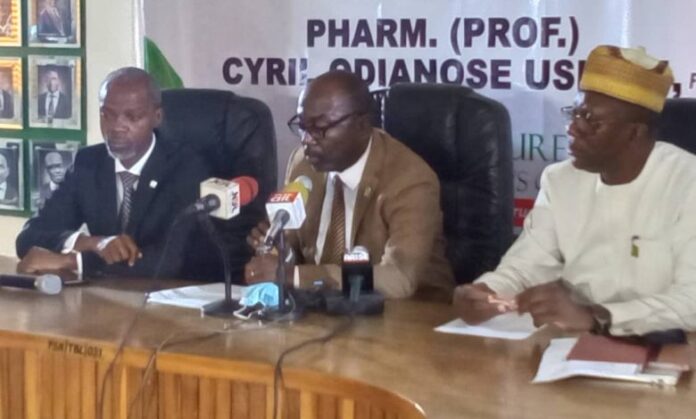President of the Pharmaceutical Society of Nigeria (PSN), Professor Cyril Usifo, has faulted the dissolution of the Governing Board of the Pharmacy Council of Nigeria (PCN) by the federal government, saying it was a misguided action.
Speaking at the at the 96th Annual National Conference tagged ‘Jewel City 2023’ held in Gombe, Gombe State recently, Usifo expressed his displeasure over the dissolution of the Governing Council of a body saddled with direct responsibility to regulate and control drugs in the country, thereby incapacitating it from functioning effectively.
He said the government recognised the sensitivity of drug matters as placed on the exclusive list and did not dissolve the Governing Councils of National Agency for Food and Drug Administration and Control (NAFDAC) and National Drug Law Enforcement Agency (NDLEA), but dissolved that of the PCN without recourse to its critical role to regulate and control pharmacy practice in the country, including wholesale distribution, importation, and manufacturing of drugs, vaccines and medical consumables.
“The sensitivity of the endevours listed , which are legally considered as drug matters, is the fundamental reason most nations of the world find it imperative to bring drug use matters under central or federal control. Nigeria is not an exception to this reform, and this why drug matters are listed as item 21 in part 1 of 2nd Schedule in the 1999 Constitution.’’
He said the federal government was misadvised by some financial technocrats who want to save money for the government without thinking of the consequences.
Usifor raised the alarm over the collapse of regulated drug supply chains in the country, which according to him, is one of fallouts of the dissolution of the PCN Governing Council.
“The federal government probably conscious of the sensitivity of drugs matters as placed on the exclusive list did not dissolve the Governing Council of NAFDAC and the NDLEA but was not guided in the dissolution of the Governing Council of the Pharmacy Council of Nigeria (PCN) which speaks, regulates, controls and issue certificates to practice all retail, wholesale distribution, importation, manufacture of drugs and vaccines, veterinary products, dressings, and consumables in Nigeria,’’ Usifo said.
According to him, despite federal government involvement, the country is faced with the challenge of “over two million unregistered pharmaceutical premises, over 35 open drug markets, dispensing physicians in private hospitals, a thriving drug abuse and misuse culture which is seriously consuming our people especially youths and even women.
“You cannot possibly have a consuming evil of such monstrosity I am portraying, and you walk away as a government because some financial technocrats think they want to save money.
“It amounts to a comprehensive abdication of responsibility by an otherwise responsible government to contemplate this with PCN, which is both a peculiar and unique professional regulatory council,’’ said Usifo.
He argued that “even from the purview of existing laws, the federal government is compelled in Section 9 (1) of the PCN Act 2022 to provide budgetary and extra budgetary allocation to the PCN. It will, therefore, be unlawful and illegal for the Budget Office to stop allocations to the PCN in public interest.’’
Usifor, who is sad over the state of the Drug Revolving Fund(DRF) revealed that 56 federal health institutions are indebted to pharmaceutical companies in the country by a whooping N30 billion this year due to the collapse of the scheme.
Usifo blamed the situation on the diversion of proceeds of DRF scheme to other things other than what the fund was meant for.
Describing the creation of the drug revolving fund as one of the salient fallouts of the old essential drug decree 43 of 1989, now the essential drug act cap 252 LFN in 2004,
Usifo explained that the scheme was designed to deal with the challenges of the perennial out of stock syndrome in public health institutions.
He said, “DRF manual was designed to achieve a successful scheme. DRF scheme was working very well from its inception until the different hospital management began to mutilate the original configuration of the DRF manual. A fundamental provision of the DRF manual was a compelling need to designate a pharmacist, preferably the HOD pharmacy as the project manager and a compulsory signatory in the DRF scheme. Like the name of the scheme suggests, any diversion of the proceeds of the DRF ultimately would lead to financial decapitation and collapse of the scheme.’’
“To buttress the fact that a well-run DRF tackles the menace of this out-of-stock syndrome in public pharmacy department, DRF scheme of the National Orthopedic Hospital Igbobi (NOHI) which was the flagship over a decade ago give birth to a pharmacy house worth over 300 million in 2014 without a collapse of the DRF programme because the management of the hospital at the time gave to the much-needed cooperation.’’
He blamed the collapse of the scheme on misapplication of proceeds, insisting that the, “militating bane of collapse DRF schemes in the various FHIs at federal level, states and LGA levels remains the unfortunate reality that the DRF proceeds were diverted to other endeavours apart from drugs, contrary to the provisions in the DRF Manuals.
“As it stands today, the 56 FHIs owed the pharmaceutical industry a staggering 18 billion naira as of 2021 and now 30 billion naira in 2023 and this is a major reason the companies are no longer interested in supplying debtors which unfortunately are the government hospitals,’’Usifo said.
Continuing, he said, “In 2021, the PSN and JOHESU drew the attention of the Federal Ministry of Health to the problems of collapsing DRF schemes including the gargantuan distortion witnessed at NOH Igbobi, which was the national benchmark for the DRF. We called for a probe of the NOHI affair as well as clamoring for a special retreat to resuscitate DRF by bringing together the HOD, pharmacies and physicians/CEOs of all the FHIs.
“The federal Ministry of Health agreed to the request to probe the misnomers at NOH Igbobi while also accepting the concept of the retreat proposed by the PSN.”
He lamented that the ideas were truncated by policy changes by the government. “As frequently witnessed with government, policy somersaults have ensured the PSN/JOHESU request were not adhered to by the immediate past leadership of the Federal Ministry of Health.’’
“In the new order, the PSN demands with a huge sense of responsibility that the DRF retreats proposed in 2021 should still hold,’’ Usifo said.
“The PSN also solicits legislative action to back the implementation of sustainable DRF scheme as the minimum benchmark that compels availability of essential drugs in all public pharmacy departments.’’
He advocated for what he called infusing renewed energy into pharmacy education for an impactful future.
According to him, “as far back as 1999, the PSN at its AGM in Enugu, approved the Doctor of Pharmacy, as the minimum registrable degree to practice pharmacy in Nigeria. After years of vicissitude, oscillations, and vacillations from 2008 to 2015 by the leadership of PSN, the stage was set for a former approval of the Doctor of Pharmacy curriculum by the National University Commission in late 2015.’’
He said that many Nigerian universities have not commenced the implementation of the Doctor of Pharmacy programme in Nigeria, is a poor testimonial.
“For our colleagues in the civil service, it makes a huge mess of the efforts PSN and its other strategic partners who have achieved enhanced entry levels, call duty and other allowances for holders of Doctor of Pharmacy as endorsed in existing circulars.’’
He warned that PCN would probably withhold accreditation to facilities of Faculties of Pharmacy that refused to commence the Doctor of Pharmacy programme to enforce compliance of the programme.
“The annual general meeting at this conference must empower the PCN to probably withhold accreditation to facilities of Faculties of Pharmacy that refused to commence the Doctor of Pharmacy program,’’ he said.























